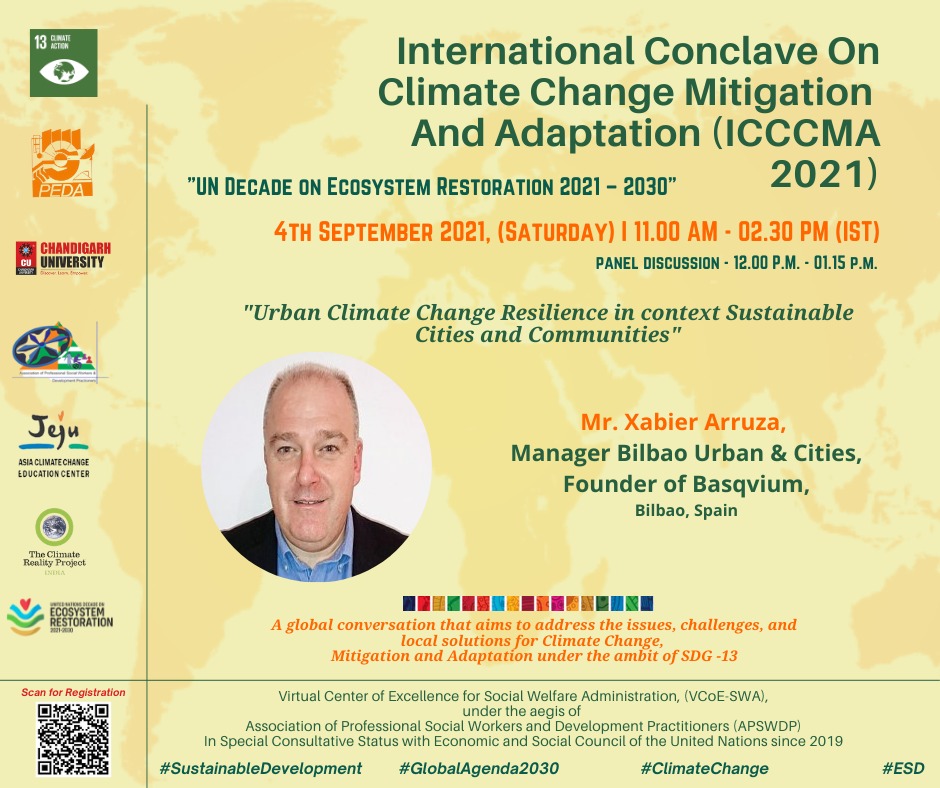Xabier Arruza, Coordinator of Bilbao Urban & Cities Design, participated on behalf of the association in the International Conclave on Climate Change Mitigation and Adaptation (ICCCMA) held virtually last Saturday, September 4th. The event was organized by The Association of Professional Social Workers and Development Practitioners (APSWDP) in collaboration with Asia Climate Change Education Center (ACCEC); Jeju; South Korea; The Climate Reality Project-India (TCRP); Punjab Energy Development Agency (PEDA); The Government of Punjab and the University of Chandigarh.
Climate change is affecting every country on every continent. It is disrupting national economies and affecting lives. Weather patterns are changing, sea levels are rising and weather is becoming more extreme. Although greenhouse gas emissions are expected to decrease due to travel bans and the economic slowdown resulting from the COVID-19 pandemic, this improvement is only temporary. Once the global economy begins to recover from the pandemic, emissions are expected to rise to higher levels.
The Paris Agreement, adopted in 2015, aims to strengthen the global response to the threat of climate change and also the capacity of countries to cope with the impacts of climate change. To address this issue and provide sustainable solutions, ICCCMA discussed various issues, challenges and solutions.

Regarding Xabier Arruza’s participation, he addressed the issue of urban resilience to climate change, talking about Bilbao and the changes it has undergone in recent years to become a competitive and smart city moving away from the industrial Bilbao of previous centuries.
He highlighted the investments made in public transport and the promotion of new methods of sustainable mobility, as effective measures for the reduction of GHG emissions associated with private vehicle transport. He also highlighted the recent proposal to reduce the speed limit in the whole city to 30 km/h.
Among the final recommendations made to be implemented in Indian cities, we would highlight the following:
- Foster national urban planning and planned city extensions, linking them to the overall process of national development, as Smart Cities Mission in India.
- Invest in compact design cities, creating districts with all the public services nearby, in order to avoid the need of transportation.
- Establish an adequate provision of common property, including streets and open spaces, together with an efficient pattern of buildable plots.
- Consider environmental damage as a loss of competitiveness. Sustainable development is a necessity and the citizenry must be aware of it.
We look forward to continuing to collaborate with India and to start working on new projects in the country that faces the greatest urban challenges on a global scale.

La Asociación “Bilbao Urban & Cities Design” que agrupa a una serie de profesionales y empresas a modo de Think Tank, que apuestan por nuevos modelos de ciudades más inclusivos y sostenibles, así como por estrategias innovadoras de crecimiento y participación.
Entre sus servicios está la divulgación de contenidos de interés mediante la preparación de jornadas técnicas y encuentros entre profesionales del sector, como en este caso; así como la realización de programas de formación, asesoramiento y capacitación de técnicos y personal relacionado con la estrategia económica y de gestión urbana de ciudades.

Recent Comments